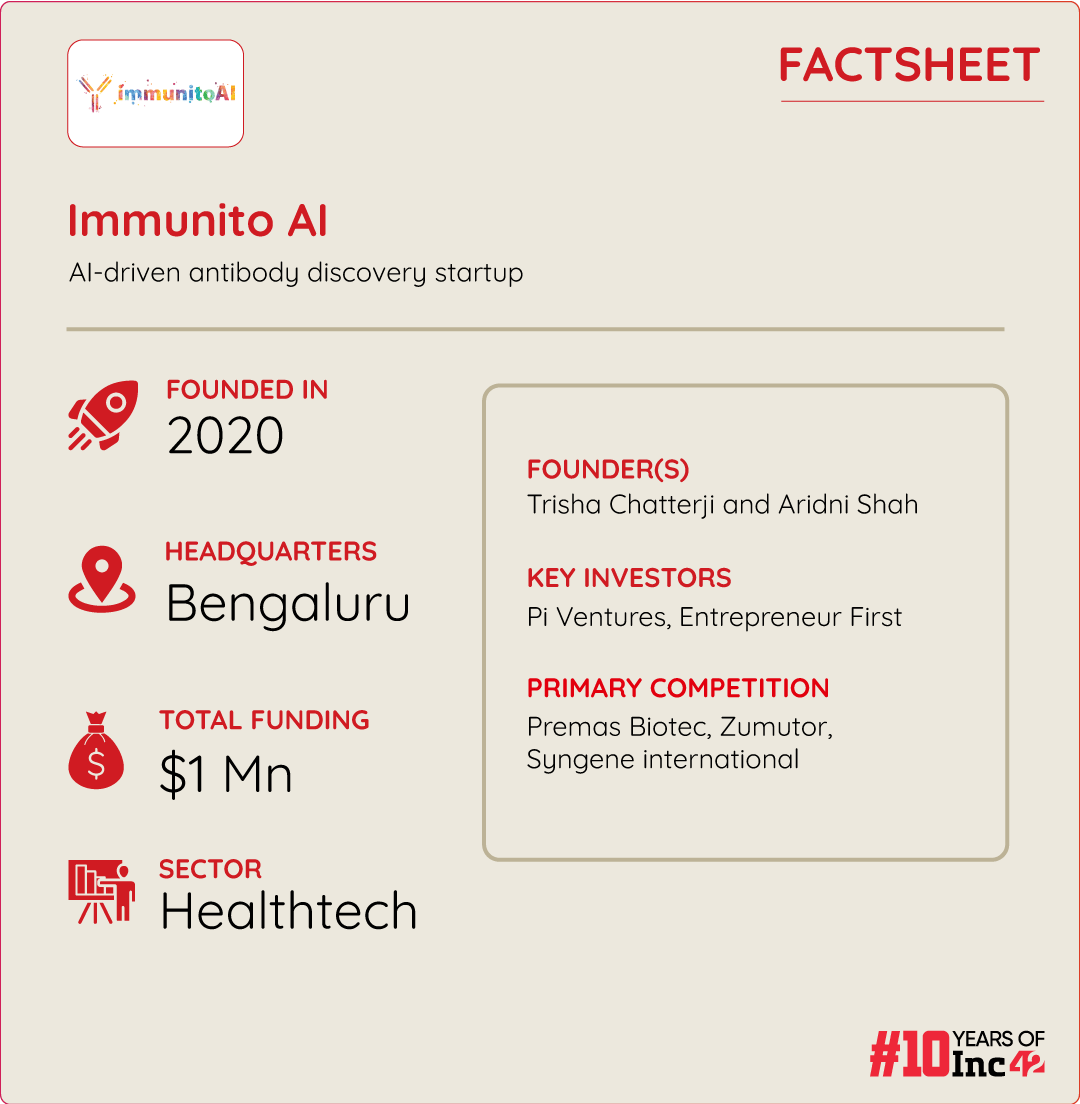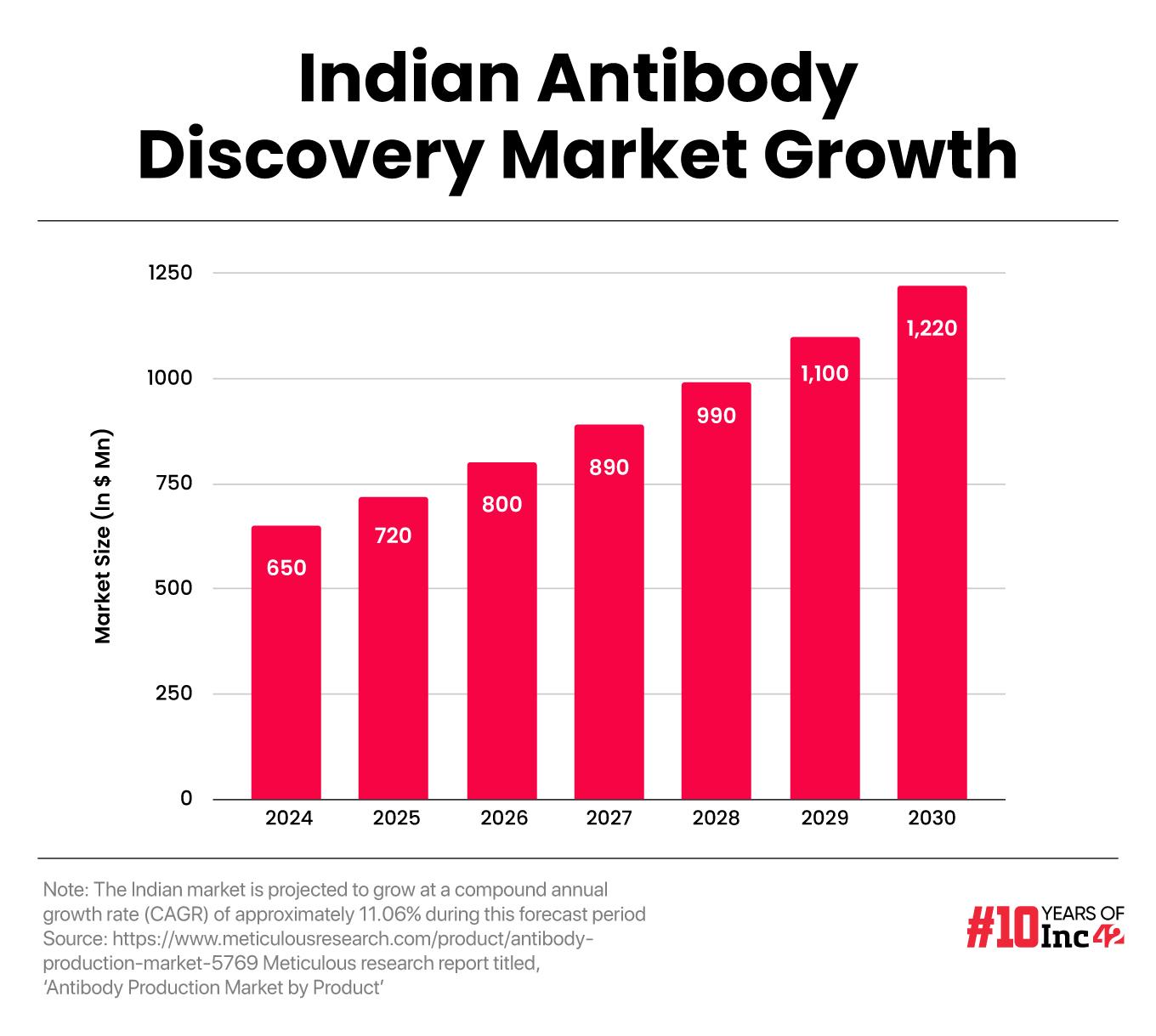Founded by Aridni Shah and Trisha Chatterjee in 2021, the biotech startup is using artificial intelligence (AI) to expedite antibody discovery all while making the process cost effective
Immunito AI treads differently as compared to traditional antibody discovery companies that follow the standard operating procedures of injecting target proteins into animals to produce antibodies
Currently in the testing phase, Immunito AI secured $1 Mn in seed funding led by pi Ventures, with Entrepreneur First also participating
Earlier this year, we reported how the Indian healthcare sector was poised for a complete makeover with the advent of GenAI. From lab assistance and clinical diagnosis to health monitoring and drug discovery, hardly anything falls outside the ambit of this emerging technology today.
In fact, the technology has now seamlessly seeped into the realm of medicine and antibody discovery to combat some of the most gruesome diseases known to mankind.
However, given that the tech is in its nascent stages, we have yet to make major headways towards making the use of this tech cost-effective and more agile. Any move in this direction will prove to be pivotal, as it typically takes more than a decade and billions of dollars in investments to discover a new drug and then bring it to market.
It is this paradigm that Bengaluru-based startup Immunito AI aspires to disrupt. Founded by Aridni Shah and Trisha Chatterjee in 2021, the biotech startup is using artificial intelligence (AI) to expedite antibody discovery and reduce its cost.
Operating in a market expected to reach $13.21 Bn by 2028 on the back of increased investment in drug discovery and demand for precision therapeutics, the startup uses AI to design novel antibodies from scratch. In the process, the founders remain laser-focused on reducing drug discovery time from years to months. In September 2021, Immunito AI secured $1 Mn in seed funding led by pi Ventures.
Immunito’s Inception Saga
The startup’s story began in 2020 with Entrepreneur First’s (EF) talent program, which brought Shah and Chatterjee together, as they shared a common goal of changing how drugs are discovered. This eventually paved the way for the incorporation of Immunito AI.
“EF’s program provided the platform for us to meet and combine our expertise,” Chatterji said.
However, the path ahead presents significant challenges, and the biggest one amongst the spectrum was scepticism of the industry and investors towards AI applications in the field of biology.
The biotech industry’s history of unfulfilled promises, and there are several of them, has bred scepticism towards AI in healthcare. “In biology, AI has unfortunately been misused. Many have made humongous claims and have not delivered. Hence, people are sceptical to accept AI-based solutions in biology,” she said.
Immunito AI faces the challenge of proving its AI-driven approach can truly accelerate antibody discovery while maintaining scientific rigour. The founders’ combined expertise in biology and computer science has been crucial in addressing these concerns.
Nevertheless, as per Chatterji, Immunito AI treads differently as compared to traditional antibody discovery companies that follow the standard operating procedures of injecting target proteins into animals to produce antibodies. Chatterji added that this popular practice can take years and doesn’t guarantee effective drug candidates.


Speaking about the startup’s AI tech stack, the cofounder said that the Immunito AI platform comprises two main arms: imDESIGN and imRANK.
She elaborated that while imDESIGN utilises generative AI models to create new antibody designs from scratch, imRANK then evaluates these designs, predicting how well they might bind to their targets and ranking them based on various parameters.
The platform employs deep learning algorithms trained on experimental data from protein databases. In addition, it uses graph neural networks to represent the 3D structure of proteins and transformer models to generate antibody sequences.
“Our AI models work at the atomic level, analysing the interactions between individual atoms in the antibody and target protein. This allows for a more precise prediction of binding affinity and potential drug properties,” Chatterjee further explained.
Although in the testing phase, Immunito AI has achieved 80% accuracy in generating biologically viable antibody sequences.
“Currently, we’re focused on improving the binding affinity of antibodies to their targets. Our next step is to benchmark our antibody designs against existing ones. We’ll select a target with a known antibody in the market and generate our own version. This will allow us to compare the development timelines and efficacy,” the cofounder said.
Apart from this, the startup plans to conduct laboratory experiments to validate its AI-generated antibodies. This includes synthesising the antibodies and testing their binding properties and stability in real-world conditions.
What’s Ahead For Immunito AI
Currently, Immunito AI has plans to collaborate with pharmaceutical companies to design antibodies aimed at specific diseases. Once the startup develops promising antibody candidates, it plans to licence them to pharmaceutical companies for further development and clinical trials.
“We’re in discussions with several top pharmaceutical companies. They’re interested in our ability to potentially reduce the time and cost of the initial drug discovery phase,” Chatterji said.
The startup is also in the process of protecting its intellectual property. Looking ahead, Immunito AI is preparing for future funding rounds.


Meanwhile, companies like Immunito AI seem to be growing in the world’s third-largest startup ecosystem. In March this year, we extensively talked about a similar startup, Boltzmann, which, too, harnesses GenAI to facilitate drug discovery and enhance the success rates of clinical trials.
Boltzmann uses both open-source and proprietary models to design novel drugs and optimise R&D processes for Indian drug manufacturers. Alongside this, Boltzmann’s technology stack includes four platforms that aid in clinical trials, disease diagnosis, and the design and discovery of vaccines and antibodies.
As per a report, the Indian market for AI in drug discovery is projected to surpass INR 2.57 Lakh Cr by 2028. For now, it will be interesting to see how Immunito AI changes the drug discovery game in the country going ahead.



![[CITYPNG.COM]White Google Play PlayStore Logo – 1500×1500](https://startupnews.fyi/wp-content/uploads/2025/08/CITYPNG.COMWhite-Google-Play-PlayStore-Logo-1500x1500-1-630x630.png)